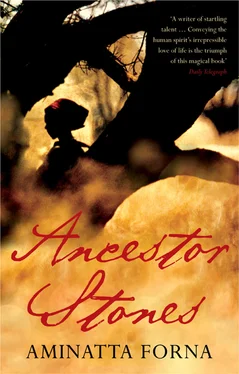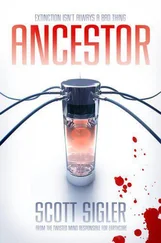This is what I think about luck. Luck is like adjoining pools of water, each flowing into the other. One pool might be dry, the next pool overflowing. It’s the same with luck. Some people have everything. Other people have nothing. The people who have plenty just seem to get it all, all the luck that ought by rights to belong to someone else. That’s the way it was with me. Always the luck just seems to drain out of my pool and into somebody else’s.
The first time I had this thought I was floating on the water in a canoe. I was on my back staring at the sky with my eyes shut, the sun a vast orange ball against a black sky. I squeezed my eyelids harder shut and watched the colours change: bursts of blue, then violet, then red, like fireworks.
Somewhere Ya Isatta was calling my name. I could not have heard her from where I was, but I knew it anyway. I knew she would be calling me to run with a message, or fetch her a cup of water, or help her search for her head-tie or prayer beads because that was all she ever did, all she ever had done since she moved into my mother’s house.
When I opened my eyes the world had turned black and white, blurred, like a charcoal drawing somebody had tried to rub out. Sketched trees and mangroves, branches overhanging me black against the sky, and the grey, twisted trunk of the tree the canoe was tied to.
I sat up and stared at the water. I saw my own reflection and gazed at it for a second before the movement of the canoe in the water caused my face to wrinkle suddenly. The sun glared down on the water, but here and there, where the shadows of the trees fell, it was possible to see right down into the yellowish depths to the mud and weed growing on the bottom. A shoal of tiny fish darted past, zigzagging, flashing as their scales reflected the sunlight. I watched them go. In less than a day the fishing season would start again.
The canoe floated upstream of the dam the men had built across the water. The dam was built every year during the dry season when the water was low. When the rains came the stream swelled and the level of the water above the dam rose. The fish spawned and grew fat, trapped behind the wall of logs. On the last day the men set their traps: long, conical baskets pushed into the dam wall at intervals. They stuffed the ends with rice and the fish swam down to feed and were trapped. In the morning, at the same time as the women prepared to enter the water with their nets, the men would come down and heft the baskets out of the water. Baskets brimming with fish. Fish for the evening meal. Fried fish for breakfast. Fish for smoking in giant kilns. Fish for the days of hunger, when the river was barren as the desert.
As I stared into the water I thought about my mother. I thought about the way Pa Yamba had tricked her when she was dying and I thought of all the people who chose to believe the lies because it suited them that way. I thought about her life, now overshadowed by the manner of her death. I thought about all these things. And as I sat there — just like that, I thought of a way to turn my luck around.
I crawled out of the boat and made my way through the tangle of trees to the edge of the dam. The ground was muddy. I nearly caught my foot on roots many times. Tiny crabs hanging from the branches dropped down and clung to my clothing. I worried about the water snakes that liked to disguise themselves among the roots of trees. I pulled my lappa up and knotted it up around my chest and I slid into the water on the other side of the dam. I waded in until the water came up to my chest.
It wasn’t easy. Especially with the first one. I was hampered by the water and my feet slid in the mud. So then I found a piece of wood and pushed it in between the edge of the basket and the logs, and in that way I levered the basket out. The water came gushing through the hole I had made, and with it dozens of the fish caught behind the logs.
Thrashing carp and smooth, whiskered catfish, curled eels, snapping tigerfish and snouted barbs; fish spotted, striped, scaly, smooth. Water and fish poured over me and almost knocked me over. I put out my hand and touched them as they swam past, stroking their sleek bodies with my fingertips. The next moment they were gone. I stood there breathing for a while, waiting to see if anybody who happened to be down by the river had noticed. But all was quiet except for the faint hum of insects and the sound of water pouring through the hole in the dam.
The rest came easily. And by the time I reached the other side the dam was beginning to break up. Small logs dislodged themselves and floated downstream after the traps and the fish. I pushed at the remaining heavy logs and they felt light. I thought probably it was too dangerous to swim back the way I had come, so I made my way up the opposite bank and crossed further upstream where the water was deeper but the river was narrower. And I walked back home through the rice fields and allowed my clothes to dry on the way.
Of course they all thought it was her. My mother — come back for revenge. Whatever else they did or did not believe, there was not a soul in the village who dared defy a ghost. And Pa Yamba made an offering to try to appease her. I laughed inside, especially when Ya Isatta began to tell me how much like my mother I was, trying to flatter me. I just bowed my head modestly and thanked her, never looking at her directly. But I could feel the big yell growing in my chest, bursting to come out. How I wanted to throw back my head and open my mouth wide and shout at her, shout at them all and tell them it was me. It was me. It was me who let the fish out.
But I knew better than that. Life hadn’t been fair to me. I kept quiet. And that day I learned how to turn my luck around.
5 Serah, 1950: Woman Palava
My mother? I haven’t thought about her in a long time.
My mother left.
Tried to alter her destiny. Looking back it was a brave thing to do, I suppose. Foolish, maybe. I don’t know. Who did she think she was?
She was Saffie. The tenth wife. Imagine it.
A tenth wife has no status. Not much better than a servant. But sometimes it is the lowliest people who have the most courage — because they’re the ones with the least to lose.
There are things I remember. I don’t know if any of it makes sense. Some questions were never answered. And there were other things I made myself forget.
Well, let me see. Where do you want me to start?
My mother used to tell me how she first met Ya Namina. My mother was a young girl standing at the side of the path when Ya Namina and her entourage passed by on their way back to Rofathane. She had been at court with her husband and was returning without him. My mother was carrying a pot of water and she stepped off the side of the road to allow this woman past. Whoever she was, my mother could see she was important. Everybody around her was laden while she walked ahead unburdened.
Ya Namina had journeyed for many miles. She beckoned the child with the water pot over. My mother lowered the heavy pot from her head, filled a cup of water and held it out to the older woman, bowing as low as she could. Bent over double like that she noticed the woman’s feet: long toes, and toenails that curved at the ends and pointed downwards. Ten toes pointing at the ground.
As my mother stretched out her hand for the empty cup, the woman touched her chin, tilting her face upwards. She asked her name and what family she belonged to. That was it. Where it all began. How she became my father’s next wife.
Three years later she saw the moon. Two years after that she was taken to her husband’s room. Ya Isatta performed the obligations on behalf of Ya Namina, bathing her, rubbing her limbs with oil and perfume, carrying her into the room. That night my father sat on a cushion on the tapestries on the floor, counting silver coins, stringing them, through the hole in the middle of each one, into great ropes of money. My mother perched on the edge of the fourposter bed, a bed as big as a boat, and watched him until she became drowsy and fell over backwards. In the morning she woke up alone.
Читать дальше












